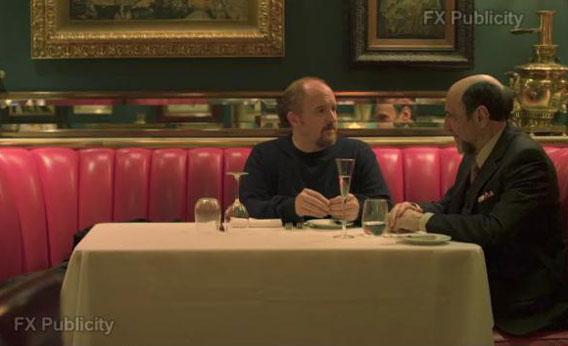Each episode of Louie falls, structurally, into one of two categories. Some episodes take shape as long walks that meander toward climactic set pieces—off-kilter encounters, unlikely tableaux, fantastical scenarios. Those set pieces then justify, organize, and seem to have inspired everything leading up to them. And these episodes tempt reverse engineering: Sitting down at his computer, C.K. seems to have asked himself, “Wouldn’t it be wild if ____ happened?” and then to have constructed 20 minutes of television that, winding this way and that, lay the groundwork for ____ happening. Fill that blank with Chelsea Peretti escaping a bad blind date in a helicopter, schoolchildren piling into a gleaming fleet of town cars, Louie and Ramon stammering their way through the fogs of man-love, an insufferable prick mourned passionately by strippers, a duckling tumbling from a backpack and single-web-footedly relaxing American-Afghani tensions …
Other episodes, though, exist not to set up a single scene or payoff but to more concertedly and systematically mine the comedic-dramatic possibilities inherent in a certain situation—Louie goes apartment hunting, Louie has to fill a day without his kids—or in a fraught run-in with a certain character (Parker Posey’s Liz, Doug Stanhope’s Eddie, Dane Cook’s Dane Cook).
Some episodes blur these categories, but it’s the ones that hew most closely to the former model—such as last night’s “Dad”—that give this series its distinctive flavor. Which isn’t to say these episodes are necessarily better; sometimes they feel uneven or thin. But they share an unhurried, shaggy-dog, picaresque quality that’s like nothing else on television—and which is especially strange to encounter in a comedy context, where we’re used to taut setup/payoff structures, bomb-tick timing, and a steady sprinkling of regularly spaced laughs. I think what we’re seeing in category No. 1 is the narrative-TV analogue of C.K.’s stand-up routines, which appear slack and conversational even if they are finely and deliberately crafted—and where the path to a big, ultimate laugh is marked by tangentially related social observations, vignettes, digressions, detours. It’s this quality—along with the series’ impressively rendered emotional range—that prompts viewers to compare Louie episodes to short films.
The set piece that I imagine occasioned the rest of “Dad” was the realism-rupturing action-movie escape—like the Peretti helicopter stunt, but with the emotional stakes upped and the means of egress shifted from the air to land and sea. On paper, “Dad” might seem like a category No. 2 episode, where a comedic-dramatic situation—Louie must confront his estranged father—is explored. But there isn’t actually much exploring here. We’re told virtually nothing of Louie’s father’s personality besides the detail of his negligent horse-sitting history—phenomenal F. Murray Abraham performance, by the way, and phenomenal sound effects on his first phone call to Louie!—and we know virtually nothing of why Louie’s body breaks down with such violence at the prospect of seeing the old man. We accept that they have issues, but the content of these issues is opaque, and their rehearsal never comes to pass. Instead there is a series of vignettes that suggest a coherent narrative logic circuitously and gradually: violin gag, electronics store gag, Basquiat-porno card-game gag, etc.
Louie’s father, notably, winds up being almost wholly incidental to an episode named for him—his dramatic function is to wind up the gears and set into motion a puke-spewing, rash-sprouting, nosebleeding anxiety machine. That moment on the surveillance video where another actor plays Louie worked for me, David, because it dipped our hero into a Lynchian slop of identity confusion for a few uncanny seconds, splitting him from himself in a way that anticipated his body’s eventual psychosomatic mutiny. If you read the episode, literally, as an excavation of Louie and Louie père’s father-son tension, it might feel like a glancing and unsatisfying treatment. If you read it, however, as a more abstract and idiosyncratic tale of about an absent watchmaker and the psychic junk that is his legacy, it thrums with a rowdy existential power. Is Louie on the bobbing boat an image of freedom or an image of despair?
Two Cornish hens, hold the water,
Jonah
